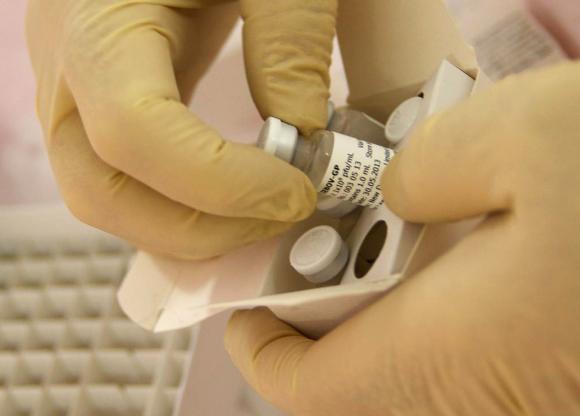Sunday Times 2
Fixing ‘Ebolanomics’ in pursuit of vaccines and drugs
View(s):LONDON (Reuters) – As researchers from Africa to China to America race to develop vaccines and treatments to fight Ebola, health experts are grappling with the economics of a disease that until this year had been off the drug industry’s radar.
Whether or not effective drugs come in time to turn around the world’s worst epidemic of the virus ravaging three West African countries, the world will want stockpiles to protect against inevitable future outbreaks, experts say.
So a new structure, which some call “Ebolanomics”, is needed to revise the business model for a previously neglected disease.

Scientists at the National Microbiology Lab in Winnipeg, Manitoba, prepare an experimental Ebola vaccine for shipment to the World Health Organization (WHO) in Geneva (Reuters)
GAVI, the global vaccines alliance, is already working to figure out how to procure a future Ebola vaccine at an affordable price, and drugmakers are considering how much to invest in a disease that, until this outbreak, had infected barely 2,400 people in total in four decades.
Even now Ebola is unlikely to become a big money-spinner for Western pharmaceutical companies, since it afflicts the poor in Africa and the need for medical stockpiles in developed countries will be modest.
Vaccine makers, governments, experts and health agencies are meeting at the World Health Organization’s (WHO) headquarters in Geneva on Thursday to come up with some answers.
“What GAVI is going to do is look at all the potential options and ask whether we should create an artificial market,” GAVI’s chief executive Seth Berkley told Reuters.
That could include making advance commitments to buy so many million doses of a vaccine, with an added incentive of offering a much higher price for the first tranche of any purchase. “There are no economics now because we do not need a vaccine in the United States or Spain or the UK, though that’s not to say people wouldn’t buy it right now because people are panicking. The problem is the countries that need it are very, very poor,” Berkley said.
Past Ebola outbreaks have killed few people and there have been no recorded Ebola deaths in 22 out of the 38 years since the virus was first identified, helping to explain the limited vaccine effort to date, even though Ebola is a simpler target than notoriously tricky ones like HIV and malaria.
This time, however, according to an analysis by the catastrophe risk management firm RMS, the Ebola epidemic in West Africa has the potential to be the most deadly infectious disease event since the 1918 flu pandemic.
It has already killed nearly 5,000 people, nearly all of them in Liberia, Sierra Leone and Guinea. The WHO believes it can turn the tide if 70 percent of Ebola patients get treatment or a safe burial, but hitting that tipping point is a challenge.
Brian Greenwood, a professor of clinical tropical medicine at the London School of Hygiene and Tropical Medicine, said the only sensible response to the worldwide alarm caused by such an epidemic is to be far more ready for the next one. “We have to be better prepared, the way we are for big flu epidemics or big meningitis outbreaks,” he said. “We have to have a stockpile. That’s what we do with yellow fever and that’s what happens with meningitis, so there is a precedent there.”
If they are ready in time and in sufficient doses, there’s little doubt effective Ebola vaccines and medicines could make a significant dent in the current deadly epidemic.
Researchers are already testing two candidate vaccines from GlaxoSmithKline and NewLink Genetics, with a third from Johnson & Johnson set to enter human trials in January. Thousands of frontline healthcare workers should start receiving them from the start of next year.

